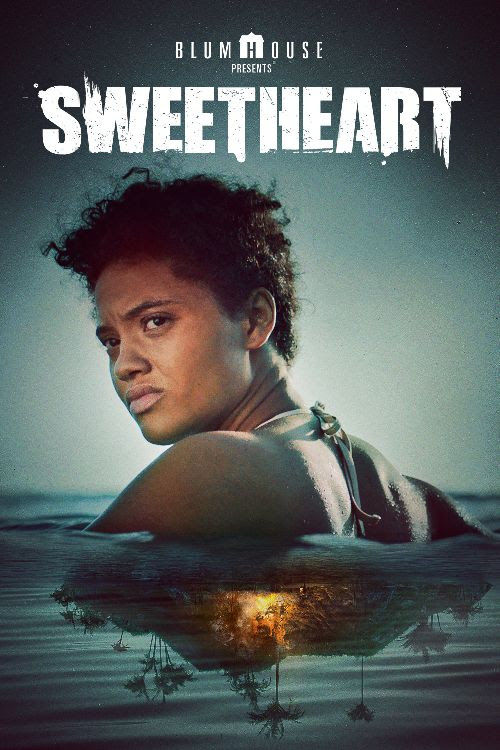Create a free profile to get unlimited access to exclusive videos, sweepstakes, and more!
Sweetheart's secret monster is white privilege

In the new horror-thriller Sweetheart, Kiersey Clemons stars as a shipwrecked heroine forced to fight for her life on a remote tropical island. It's not enough for her to scrape together sustenance and shelter, because each night a terrible monster stalks the shore, hunting for its next meal. Then, a new horror crashes into her life with a second-act twist that should mean rescue.
Spoiler warning for Sweetheart within.
For the first half of the film, Jenn (Clemons) is alone on this remote island, save for the ocean-dwelling beast that hunts her nightly. But she's resourceful. She finds water in coconuts, which she cuts open using a sharp rock as a knife. She carves a spear, fishes for food, and scavenges the island for other useful tools. When her suitcase washes ashore, she tries to fashion it and a pair of life vests into a raft. Failing that, she favors the clothes within that best protect her skin from the elements of sun, sand, and bugs. Though sometimes overwhelmed by the insane pressure of being chased by a towering creature that craves flesh, Jenn's focus is always on surviving, even when that pits others against her.
In the film's second act, a raft washes ashore. Within it are Jenn's boyfriend Lucas (Emory Cohen) and his friend Mia (Hanna Mangan Lawrence), both survivors of the same shipwreck that landed her on the island. Having already discovered the corpses of the rest of their party, Zach and Brad, Jenn is relieved and elated. But she wastes no time warning them of the monster. She feeds them, then insists they set sail before nightfall.
"It isn't safe here," she explains, "There's an animal." And here is where the title's relevance becomes clear. As Jenn shares her experience, her truth, and her warning of danger, her boyfriend—who just washed up—interjects with "Sweetheart, I'm sure there's a lot of animals." She will not be silenced. Nevertheless, she persists, "It's a monster." She tells them about its attacks, about how it dug up the corpse of their friend to gobble it. She tells them about its black blood, its nocturnal routine, and how it will kill them if they stay. But they won't listen.
There's a sharp socio-political criticism thumping at the heart of this conflict because Jenn isn't like the others. Differences in their class backgrounds come to light through costumes and conversation. The boys wear button-down shirts, khakis, and polo shirts, which suggest their boat was of an upper-crust yachting scene. Jenn washed ashore in jean shorts and a bathing suit, speaking to a class status that favors practicality over poshness. By sharp contrast, Mia emerges from the raft in a crisp blouse and culottes. And once she's had a chance to rifle through Jenn's provisions, she changes into a comically impractical full-length sundress that our heroine had set aside as useless in the first act.
Aside from hinting at class differences, these costumes reveal how these characters regard resources. Jenn, who has known hunger and desperation, favors what is essential and works tirelessly to provide not only for herself, but also for her new arrivals. Lucas and Mia sit back, letting her do all the fishing and gathering for provisions, while the latter apparently is shopping the supplies for whatever she might fancy. It never occurs to them to pitch in for their own survival. And no matter what Jenn says, it never occurs to them that they could be at risk on this picturesque island.
Then, there's the difference of race. Lucas and all his buddies are white, while Jenn is black. This comes into play when Mia proves the poster girl for white feminism as she tries to cajole Jenn away from her escape plan. Well, that is after Mia physically attacks Jenn for trying to make a hasty getaway before nightfall. Having tied Jenn to a tree and robbed her of the autonomy of mobility, Mia tries to bond by comparing Jenn's struggles with her time floating monster-free on the raft. But when Jenn says something that challenges Mia's perspective — and more importantly her wishes — it's rejected outright. "I think we've all been through something traumatic," Mia clucks, "and we're trying to deal with it in our own ways." Sure, Jenn is trying to deal by getting the hell off the island. Mia is dealing by gaslighting Jenn to distrust her own eyes.
But Jenn's not buying it. Bound but not broken, she tells Mia, "I really don't need you to tell me what's best for me."
Then, Lucas joins in, using his position as her man to chastise her. He declares, "There's always a black cloud over your head." The implication is that Jenn is the maker of her own dark fate by being less chipper than her wealthy, white cohorts. As if her smiling more would scare the monster away. Then, he and Mia team up to throw Jenn's lack of wealth in her face. Lucas berates her, insisting that without him, the rich boyfriend who pays her way, she'd have nothing to go back to, hissing, "I pay for your life." And Mia drudges up how Jenn "lied about being mugged." An astute audience member might deduce that Jenn's lie was an awkward attempt to save face over her lack of cash in front of a bunch of rich peers. But to Mia, the implication is Jenn can't be trusted because she's not like them.
Lucas and Mia will pay for dismissing Jenn's warnings. Both will be robbed of the cozy delusion that their privileges as wealthy white kids will protect as they did back home. Both will be dragged out of their smug semblance of society, deep into the dark undersea cave of the creature, never to return. If only they'd listened, the three of them could have teamed up to fight this tenacious terror. Instead, Jenn is left alone once more. But before she battles the monster in a final showdown, she makes one last chance to warn the world that blithely dismisses the inconvenient truths of a traumatized Black woman. She writes in her journal about all that's happened and even recognizes that she has no evidence besides her testimony. She writes, "I hope this letter is enough for you to believe me."
It's not enough for Jenn to survive; she must be believed. She must not only defeat the monster who tromps onto the sands with claws and teeth hungry for her destruction; she must also topple the societal evil that pressures the marginalized into silence lest they inconvenience those of privilege and power. It's not enough to win her fight; she must strike a blow for whoever might wash up next. She must burn the whole damn thing to the ground.
Sweetheart is now available OnDemand.
The views and opinions expressed in this article are the author's, and do not necessarily reflect those of SYFY WIRE, SYFY, or NBC Universal.


























